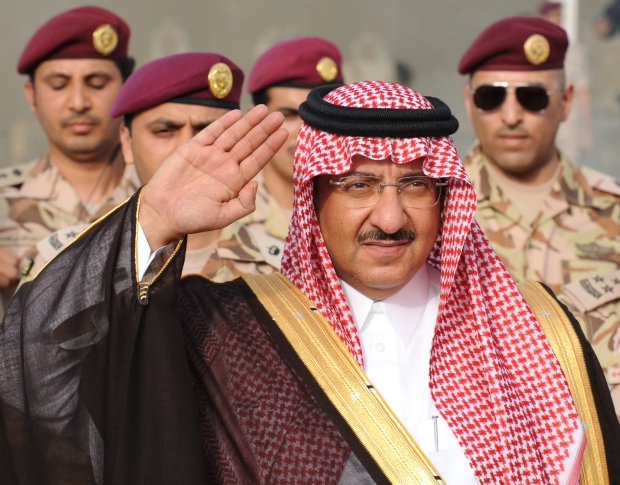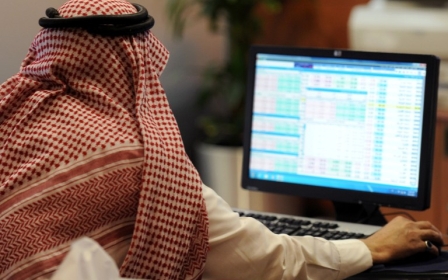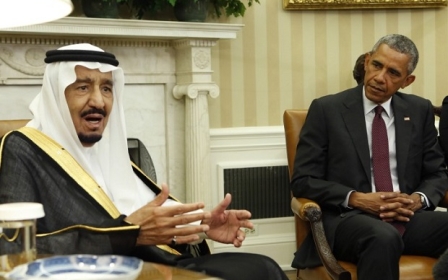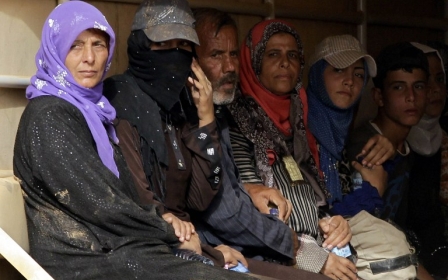Senior Saudi royal urges leadership change for fear of monarchy collapse

A senior member of Saudi Arabia’s royal family has circulated a letter expressing fear that the monarchy may collapse unless the king is urgently replaced and the position of deputy crown prince scrapped, Middle East Eye can reveal.
On 4 September, a grandson of the late King Abdulaziz Ibn Saud wrote a four-page letter calling on the royal family to hold an emergency meeting to address concerns that the House of Saud may be losing its grip on power.
“We [have] got closer and closer to the fall of the state and the loss of power,” the letter read.
“We appeal to all the sons of King Abdulaziz – from the eldest Prince Bandar to the youngest Prince Muqrin – to summon an emergency meeting with all the family to discuss the situation and do everything that is need to save the country.”
The letter was signed “a descendant of the King Abdulaziz of the House of Saud”. MEE spoke to the letter’s author, who confirmed he is a grandson of Abdulaziz, but asked not to be named for fear of negative repercussions.
The document has been carefully circulated among princes, using secure means of mobile communication, because royal family members are under surveillance by those in power, the letter’s author said.
Generational change and power politics
King Abdulaziz Ibn Saud established the modern state of Saudi Arabia in 1932. Since his death in 1953, the country has been ruled by his sons but this is expected to change when the incumbent King Salman’s rule ends, as the heir to the throne Crown Prince Mohammed bin Nayef is a grandson of Abdulaziz.
This generational shift in Saudi Arabia – despite 13 of Abdulaziz’s sons still being alive – is likely to have been the source of much debate among royals, leading to the letter being written, a regional expert told MEE.
“The most important recent development in Saudi Arabia has been the transition occurring within al-Saud itself in terms of moving from the sons of Abdulaziz to the grandsons,” said Christian Koch, director of the Saudi-funded Gulf Research Centre.
“It is not at all surprising that in light of these changes there is debate going on in the royal family about its future direction.”
The letter partly represents a generational conflict within al-Saud and comes after powerful wings of the family battled for supremacy in the aftermath of the late King Abdullah’s death this January.
The zero-sum game of Saudi politics was exemplified then by the newly anointed King Salman replacing his predecessor’s men with his own people – including the powerful head of the royal court Khalid al-Tuwaijri who was switched for his Salman's inexperienced 30-year-old son Mohammed bin Salman.
It later emerged that during Abdullah’s final hours, Tuwaijri tried to secure his own position and the second generation of Saudi’s rulers by contriving to have Abdullah’s son Prince Meteb made deputy crown prince – the position now enjoyed by Salman’s son Mohammed. This attempt failed, but not before Tuwaijri also tried to have Salman declared mentally unfit to rule.
Foreign policy and financial crises
The letter, which is set in this context of internal House of Saud power struggles, claims problems began 10 years ago under Abdullah. It argues the need to bring back older members of the Saud dynasty by criticising “totally miscalculated” military decisions in Yemen, Syria and Iraq, claiming that these choices have "weakened the trust of our people and [incited] other peoples against us".
There have been a series of sharp changes in Saudi Arabia’s foreign policy since Salman took over from Abdullah. Under the late king, Riyadh was understood to view the Muslim Brotherhood and its various offshoots as being enemy number one in the region.
This policy led to Saudi advisors reportedly being in touch with Houthi militiamen in Yemen, who they viewed as a being a bulwark against the local Brotherhood affiliate al-Islah. Under Salman, however, countering Iranian influence is viewed as a key policy priority, and, as such, his defence minister son in March launched a regional coalition against the Houthis, a group viewed by Arab Gulf states as being backed by regional rival Iran.
The war in Yemen, whilst gaining some achievements in pushing the Houthis out of southern areas of the country, has not been a shining success for Saudi Arabia. Dozens of Saudi soldiers have been killed amid an ongoing air and ground campaign, and the Houthis remain in control of the capital Sanaa, while there are reports of skirmishes inside Saudi Arabia by invading Houthis.
Meanwhile in Syria and Iraq, Riyadh joined the US-led coalition to bomb the Islamic State (IS) group in September last year, under the leadership of Abdullah. Since then the kingdom has seen IS claim deadly attacks on the minority Shia community and the government has claimed to have arrested hundreds of the group's supporters across the country.
Also in Syria the Saudi leadership has actively supported rebel groups battling President Bashar al-Assad, in a civil war where more than 220,000 people have been killed.
As with Yemen, there is currently little to suggest that in Syria Saudi Arabia is close to achieving its military goals. Assad still retains control over swathes of the country, with the international community increasingly distracted by tackling IS, which appears to be no weaker than when the US-led coalition started bombing the group last year.
The royal letter penned by a grandson of Abdulaziz also pointed to financial challenges facing al-Saud, referencing a collapse in oil prices that over the past 12 months has seen the price of a barrel plummet from $120 to less than $50. The impact on the Gulf state, which relies on oil revenues for 90 percent of its income, has been stark – a Citibank analyst recently told MEE that this year the government would have a 20-percent gap between revenue and planned spending, leaving it with one of the largest fiscal deficits in the world.
This deficit has led to Riyadh plundering its sizable currency reserves to prop up spending. In the first half of 2015 the government spent $82bn of reserves, reducing savings to around $650bn, according to Saudi investment company Jadwa. With over 10 percent of currency reserves spent in six months the Citibank analyst warned that, without borrowing, the country’s savings could run dry within two or three years.
The scale of the country’s problems – both militarily and financially – led to the grandson of the country’s founder writing that change at the top may be necessary to protect al-Saud’s future as rulers.
“We will not be able to stop the draining of money, the political adolescence, and the military risks unless we change the methods of decision making, even if that implied changing the king himself,” the letter read.
A well-connected Saudi dissident who lives in London told MEE that the letter is evidence of the royal family recognising the seriousness of the crises ahead.
“There is an awareness in the mind of al-Saud that there is something going wrong and that it needs to be faced,” the dissident, who is in regular contact with royal family members, said on condition of anonymity, fearing reprisals.
“This is a wakeup call to stop the collapse.”
Plotting a change at the top
The source said the royal family broadly falls into two camps when considering how to deal with their problems. On one side there are those who do not wish to raise any problems as they fear open disagreement may weaken themselves in the eyes of the public. On the other side there are royals who believe silence will lead to total collapse.
The letter suggested a solution for al-Saud to strengthen their position by returning power to older members of the family who have been side-lined under King Salman. The new ruler has favoured new, younger members of the family close to him – with Interior Minister Mohammed bin Nayef replacing the youngest of Abdulaziz’s sons Muqrin as crown prince, and his own son Mohammed becoming deputy crown prince.
“[We have neglected] the marginalisation of the elders and the carriers of experience, as well as the surrender of command to the new generations of foolish dreamers who are acting behind the façade of an incapable king,” the letter read.
“How could we accept the marginalisation of King Abdulaziz’s sons both in power and in the processes of policy making?”
Mohammed bin Salman has been roundly criticised for his role in leading the country’s troublesome war in Yemen. The London-based Saudi dissident said that the letter is part of an effort to side-line Mohammed, who is criticised in the text as being a “rotten thief,” and push forward a replacement king.
“The real story behind this letter is that it is preparation for [King Salman's brother] Ahmed bin Abdulaziz to be pushed towards power,” the source said.
Seventy-three-year-old Prince Ahmed is the youngest member of the powerful Sudairi brothers – an alliance of seven sons of Abdulaziz born to the late king’s favourite wife Hassa bin Ahmed al-Sudairi. He served as deputy interior minister for nearly 30 years from 1975.
In 2012 he was made interior minister, in a move widely viewed as priming him to be a future ruler. However, he was dismissed just five months later in favour of the incumbent Mohammed bin Nayef, who is also the serving crown prince. And in 2014, when Abdullah appointed his brother Muqrin as crown prince, Ahmed was seen as having missed out on the chance to ever be king.
Despite this, the London-based dissident said the prince is viewed favourably among his peers.
“Ahmed is the healthiest and most honest of the senior royals. He doesn’t drink. He’s not a womaniser. He’s the least corrupt," the source said.
“Everybody thought that he was the natural person to be appointed by Salman as crown prince. He is the real heir apparent in the minds of many people.”
The London-based dissident said that Ahmed is keen on the idea of being promoted but he is reluctant to make the move himself. The prince, while ambitious, is conscious of not appearing to be in conflict with his brother Salman and his son Mohammed.
“He wants others to push him forward for the throne,” the source said.
The grandson of Abdulaziz said in his letter that he will support royal family members being promoted “with meritocracy” by collecting signatures from princes to implement changes for the “common good”.
The letter also said that it is the responsibility of princes including Ahmed bin Abdulaziz “to collect the views and gather the ranks” of the royal family.
“They should isolate the incapable King Salman, the extravagant and vain Crown Prince Mohammed bin Nayef, and the rotten thief Deputy Crown Prince Mohammed bin Salman, who has been devastating for the state, so that the greatest and most pious assume the control of the affairs of the state and of its people.”
“We also ask for a new king and a new crown prince to be invested and take over everyone and for the abolition of the peculiar office of the deputy crown prince.”
Another regional expert said it was highly likely family members will gather to discuss changes but expressed doubt Mohammed bin Salman will be side-lined in the near future.
“I would imagine the demand for an emergency meeting is inevitable – if it hasn’t already taken place,” said Christopher Davidson, author of After the Sheikhs: The Coming Collapse of the Gulf Monarchies and reader in Middle East politics at Durham University.
“But the demand for removing the deputy crown prince seems unobtainable.”
The London-based Saudi source said that they had not been able to confirm whether the royal family had held an emergency meeting. However, they claimed to be “aware of discord and discussion about the letter”.
Mohammed bin Salman seeking a promotion
The source said that there is much speculation among al-Saud family members that once this year’s annual pilgrimage ends, which is expected to be on 26 September, the deputy crown prince will move to make himself heir to the throne.
“Some royal family members believe that once hajj is over Mohammed bin Salman will remove Mohammed bin Nayef as crown prince – by orders of his father – and appoint himself,” the source said.
“They [the royal family members] are bracing themselves for this development because they see it as very dangerous. They think it will bring revolt and make it much more likely for action to be taken to push Ahmed [bin Abdulaziz] towards taking power.”
Mohammed bin Salman is increasingly being viewed as possessing much of the power behind the throne, especially amid unconfirmed rumours his 79-year-old father is suffering from Alzheimer’s disease. The deputy crown prince recently accompanied the king on a trip to meet with US President Barack Obama where it is believed the 30-year-old played a key role in strategic discussions.
After the visit, an unnamed Arab official told the Washington Post that it is possible King Salman could alter the succession process to name his son as heir.
“Let’s face reality,” the official said. “He’s the son of the king. There’s a strong chance he will be the next king. The longer Salman survives, the larger the chance that MBS (Mohammed bin Salman) is next.”
The impression that Mohammed may be plotting a route to be Saudi Arabia’s next king likely explains the strong feeling among both the grandson of Abdulaziz and the London-based dissident that royal family members are urgently seeking an emergency meeting.
However, the Gulf Research Centre’s Koch played down talk that Mohammed is plotting a way to remove the current crown prince and promote himself to be first in line to the throne.
“One thing to remember is that the ruling family is large and anyone who wants to assert authority will need to be able to put together a broad consensus from within,” he said. “As such, suggestions, as currently circulating, that Mohammed bin Salman in preparing for a coup are quite fanciful if you ask me.”
A prominent Saudi journalist also poured scorn on the idea that a power struggle may be emerging in the country and questioned the authenticity of the letter calling for change at the top.
“I know a prince who is always exchanging with me documents and articles,” Jamal Khashoggi, General Manager of Al Arab television, told MEE. “This letter hasn’t circulated. I still have my doubts [about its authenticity].”
“The succession issue is settled for now in Saudi Arabia.”
Middle East Eye propose une couverture et une analyse indépendantes et incomparables du Moyen-Orient, de l’Afrique du Nord et d’autres régions du monde. Pour en savoir plus sur la reprise de ce contenu et les frais qui s’appliquent, veuillez remplir ce formulaire [en anglais]. Pour en savoir plus sur MEE, cliquez ici [en anglais].







